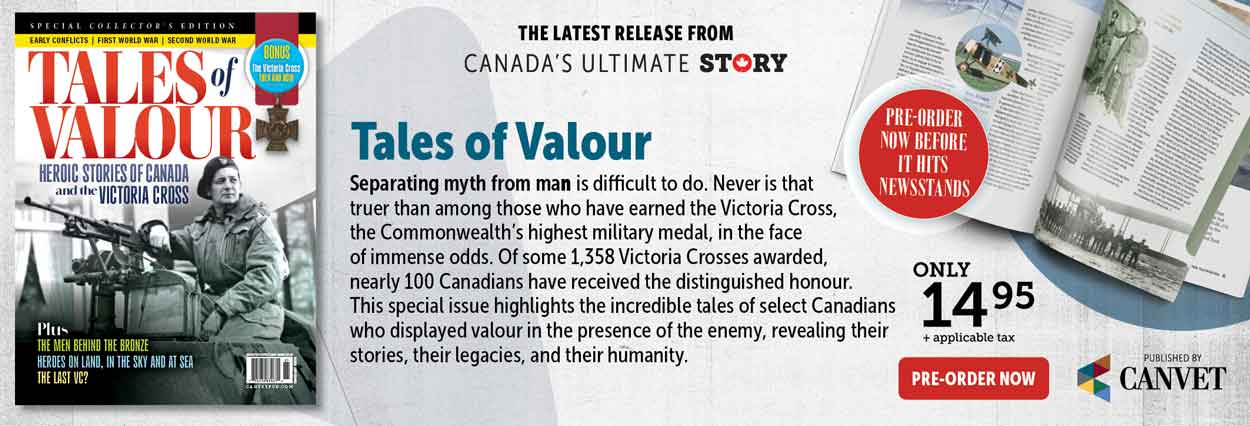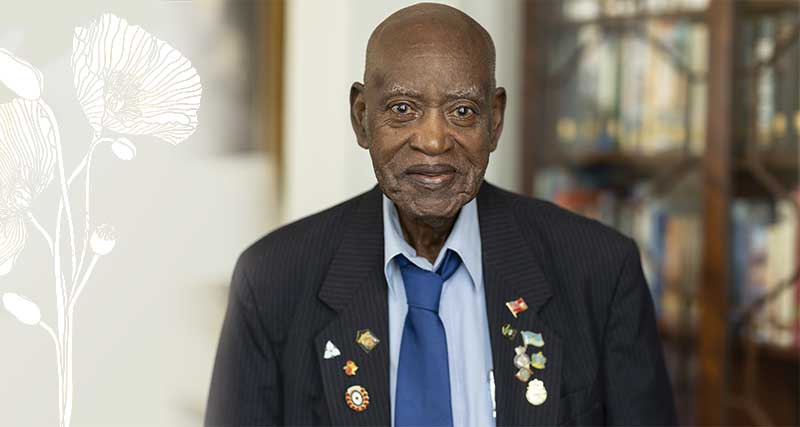
Earl Francis, 84, of Saint Lucia has volunteered for the Royal Commonwealth Ex-Services League for years, delivering food and financial support to pre-independence veterans.
While the number of veterans it serves declines, the Royal Commonwealth Ex-Services League continues to provide critical support
For more than 30 years, Earl Francis has regularly navigated the backroads of Saint Lucia, delivering food, care packages and financial support to aged veterans and widows scattered around the ruggedly beautiful eastern Caribbean island.
A retired police inspector and long-time volunteer with the Royal Commonwealth Ex-Services League (RCEL), he was caring for, during his busiest times, as many as 35 veterans and about an equal number of widows.
He would set out one day a month at 7 a.m. with a carload of goods and a bagful of cash and his day wouldn’t end until the visits and the stories were all played out, usually about 7 p.m. or later.
“They were all around the island,” Francis said after the league’s 34th conference in London, England, this past September. “I had a Toyota station wagon with all the goods in the back.”
Agents of the league are fanning out all over the Commonwealth to bring financial and other relief to veterans.
At 84 years old, Francis is still at it. Though the numbers have dwindled—he now cares for two veterans, ages 96 and 101, and eight widows—his devotion hasn’t. He has survived two bouts of COVID and,
until The Royal Canadian Legion recently bought him a laptop, Francis was filing monthly reports from an internet café.
“He is quite amazing,” said Johanna Lewin of Jamaica who, as Caribbean project officer, oversees league operations throughout the region.
“He just keeps going and I have to corral him and tell him to wear a mask, don’t go out, don’t do this, don’t do that. But Earl never stops. It’s been a life of service and he doesn’t complain.”
And, while his age and length of service set him apart, Earl Francis isn’t alone. As they have for decades, agents of the league fan out all over the farthest reaches of the Commonwealth to bring financial and other relief to veterans who served the Crown before their homelands declared independence from Britain.
Canadian Legionnaires know the RCEL primarily through the contributions they make to the organization at provincial conferences—baskets full of cash and cheques that go to the care and welfare of pre-independence veterans in the Caribbean.
Their British and South African counterparts do the same for African veterans; Australia and New Zealand look out for the rest, distributed in such far-flung places as India, Sri Lanka, Malaysia, Bangladesh and Pakistan.
The independence movement among former British Empire countries began in 1947 with the partition of India. The wave swept through Africa and into the Caribbean, spanning the 1960s into the early 1980s. But, for many individuals, the ties remain, often through links to military service.
Volunteers such as Francis were looking out for 4,580 pre-independence veterans and widows in 48 countries in 2021, the bulk of them in Pakistan, Uganda and Zimbabwe.
In 2014, the U.K. government granted the organization almost 12 million pounds (about C$23 million today). As the number of veterans and widows decreases, the RCEL has increased its support to those remaining.
The organization traces its roots to 1921, when it was formed to support former Empire soldiers, some three million of whom fought for king and country between 1914 and 1918; 440,000 became casualties.
It provided pension advice, assisted with moves to other countries, traced lost relatives and helped with money transfers and disability claims.
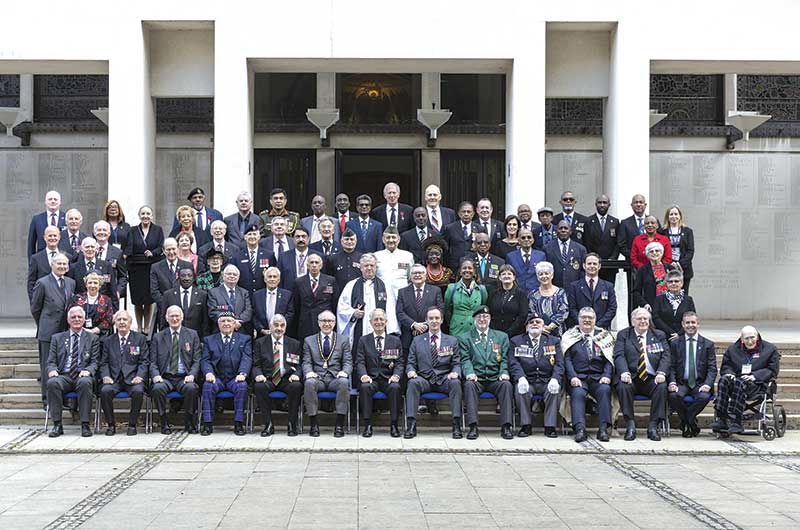
Delegates assemble for a picture following a memorial service at the Royal Military, or Guards’, Chapel, spiritual home of Britain’s Household Division. []
Another 4.5 million servicemen and servicewomen from the Indian subcontinent, Africa and the Caribbean joined the fight between 1939 and ’45; 360,000 were killed, wounded or captured. Their governments didn’t always acknowledge their sacrifices and hardships; the Royal Commonwealth Ex-Services League stepped in.
The Royal Family have been strong supporters of the league. Queen Elizabeth II was its patron. Prince Philip was grand president for more than 40 years—and not just in name; he was a regular at working meetings. In 1982, the organization launched the Prince Philip Appeal for Commonwealth Veterans.
The league is now a registered charity with 57 member organizations; it acts as a link for ex-service groups throughout the Commonwealth and the overseas agent for more than 40 U.K.-based service charities; and it provides welfare for those in need—the equivalent of two meals per day, or 1,600 British pounds a year to pre-independence veterans in Antigua and Barbuda and 516 in Bangladesh.
But the demographics and demands are changing, radically and rapidly. Once in the tens of thousands, the league’s beneficiaries are now believed to number fewer than 4,000. Some 55 per cent are widows, outnumbering veterans for the first time.
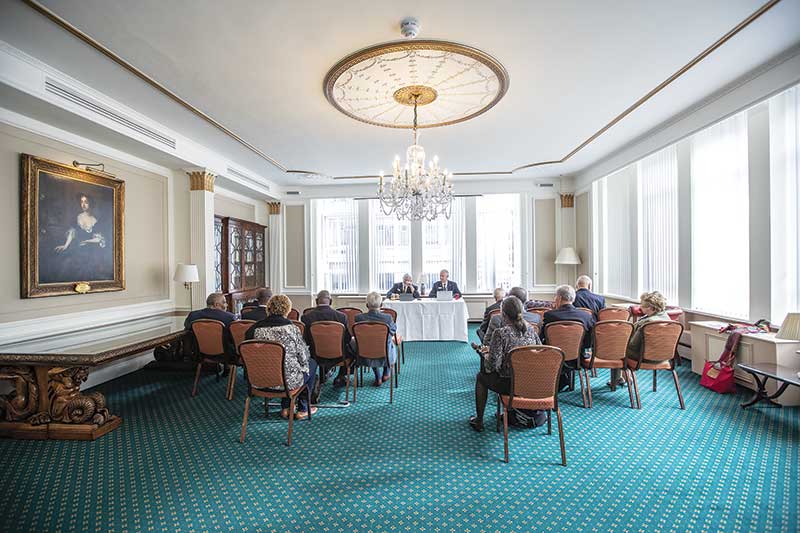
Royal Canadian Legion President Bruce Julian and executive director Steven Clark meet with RCEL Caribbean representatives.
Canada trustee Libby Watkins has seen sweeping change in the organization and its work since she started attending conferences with her predecessor, her late husband Brian, in 1993.
“It’s an evolving picture, certainly,” she said, expressing a hope that the league will find new avenues of focus beyond its current mandate. “Even if there aren’t any veterans or widows left, I think it’s a force for good.
“It’s got a message to support veterans of all wars and conflicts, and we seem to be having new conflicts now. I think it should remain, and it’s very important it remain a Commonwealth initiative. It’s the bond that unites.”
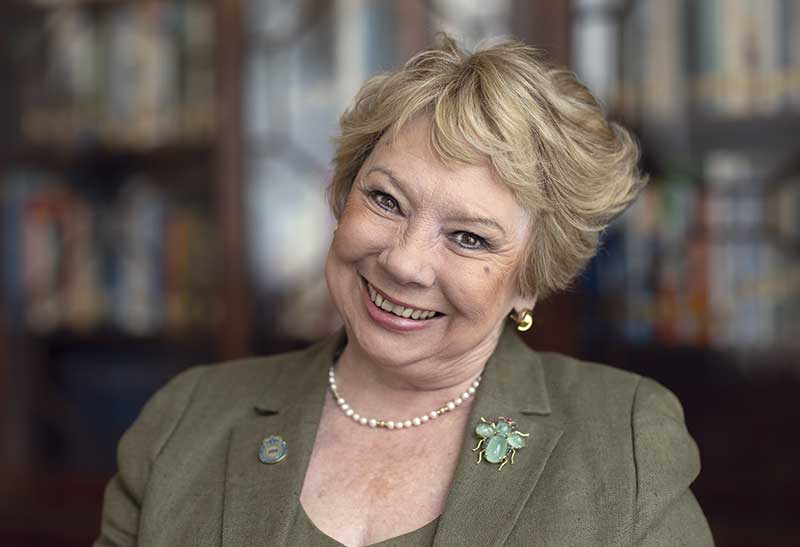
Libby Watkins, Canada’s RCEL trustee, says the league must press on in some form. Eswatini’s Gaz Barlow lost his last 10 veterans in three months last summer.
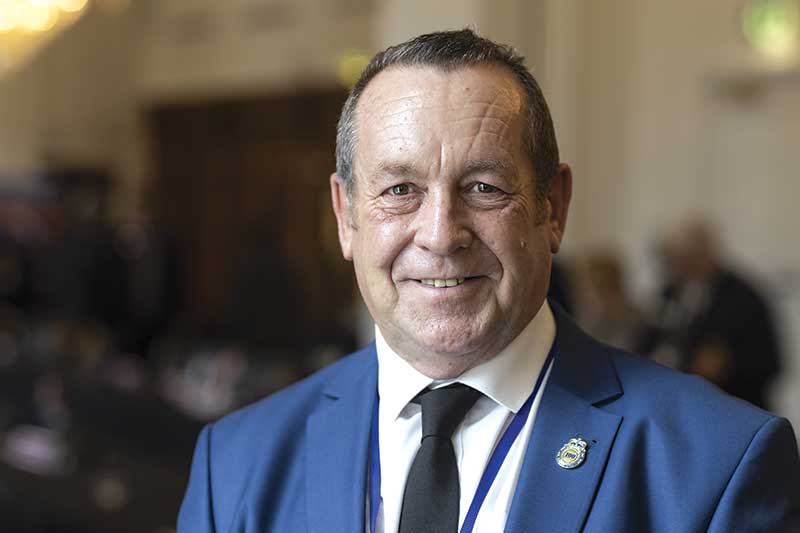
Gary (Gaz) Barlow of Eswatini (formerly Swaziland) knows those changes only too well. A former army signaller from Manchester, England, he met his wife Iris while serving in Germany. Her family lived in the tiny country in southeastern Africa, and that’s where the couple settled after he ended his 32-year military career in 2000. They’ve been doing RCEL work virtually ever since.
The couple used to make deliveries every six months, but since support levels were increased in 2019, they’re on the road every six weeks. They were providing food and funds to 74 veterans when Barlow took over the volunteer work from a friend. Deliveries to the isolated rural areas where most veterans lived took days on dirt roads.
When a league official arrived for a recent inspection, it took 14 hours to visit three beneficiaries. For Barlow, recipient of the RCEL grand president’s meritorious service award, it has been a bittersweet experience caring for a declining population of beloved veterans.
Each delivery is “like Christmas,” said Barlow. “When everybody’s paid, we still have money left. We add to it and make food hampers and take them around.”
By June 2022, however, just 10 Eswatini veterans remained—all of them Second World War servicemen—along with 16 widows. All 10 vets died in the three months
leading up to the September conference. The youngest was 101. The paperwork to secure support for their widows was in process the time of the conference.
Current British government funding to the organization, which accounts for 75 per cent of its welfare grants, runs out in March 2024. The league is seeking an extension, but insiders say the group will not disappear, regardless.
“Just because we get an extension of, say, a few years, that doesn’t mean that we’re still not thinking even beyond that,” said a senior league official.
“We hope that we will morph or merge into a still-recognizable charity or arm of another armed forces charity where we will still be…the Royal Commonwealth Ex-Services League in some way to look after the very last of our veterans and widows up until, let’s say, 2030.”
The 2022 conference was to have been held in South Africa in 2021, the organization’s 100th anniversary. But the pandemic prevented that.
The London meetings were hosted by the Army & Navy Club and nearby Canada House, where daily sessions involving about 60 delegates representing some three dozen countries were held.
Royal Canadian Legion President Bruce Julian and national executive director Steven Clark represented Canada, along with Watkins.
The Canadian Legion has co-ordinated and assisted member organizations in the Caribbean since 1966. Its RCEL Welfare Fund has assisted veterans throughout the region for years. It also provides an annual grant to the Curphey Home—a Jamaican veterans’ facility—and supplies nine Caribbean countries with poppy materials each year.
Its contribution amounts to between $175,000 and $200,000 a year, said Clark. “It varies on the number of veterans and widows, and on the poppy material that each of the island nations requires.”
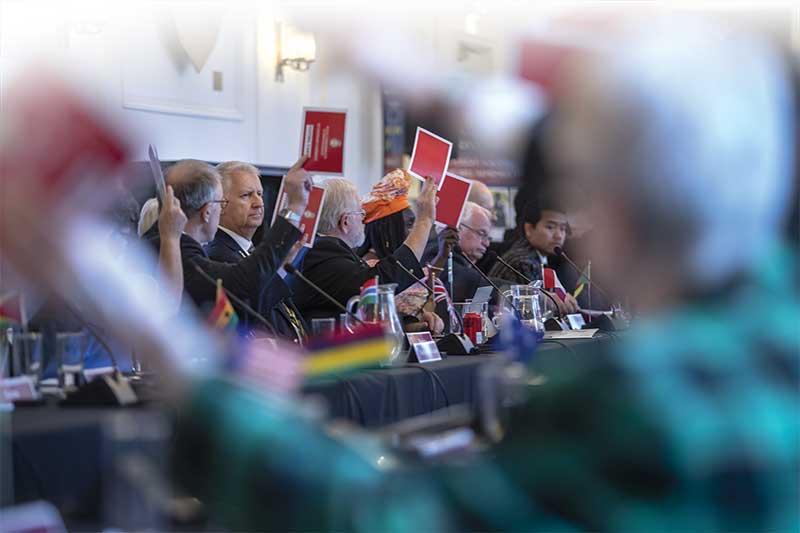
The Legion president and executive director conduct welfare monitoring of RCEL activities in the Caribbean and make evaluation visits every two years, the most recent of them in the spring of 2022, when Julian and Clark determined six volunteers needed laptops and earmarked $7,500 for them to ensure efficient communications and reporting.
It was Canada, working with input from Caribbean group members, that essentially drove conference discussions about the definition and eligibility of widows for RCEL benefits. It steered policy toward more inclusive and culturally sensitive language—a critical consideration in such a diverse organization in which sometimes complicated histories linger just below the surface of some relationships.
In particular, the issue centred on the wording of two resolutions, the most significant of them adding “or locally recognized relationships in law” to a requirement for documentary evidence of marriage.
The regional group, which met with the Canadian reps before the main sessions, also advocated deleting the words “so-called” in reference to tribal or village marriages. Echoing the concerns of group members, Julian suggested the contextual reference doesn’t belong in 21st century policy.
“Where it might seem all right to an actuary doing this stuff, it is disrespectful and those words should be dropped,” he said.
The league also altered its age qualifications for widows—a necessity for an organization with a finite amount of money to hand out. Formerly a minimum of 70 years old, with a rolling birthdate, the age qualification was set at a birthdate of no later than Dec. 31, 1950.
Said Christopher Warren, the league’s secretary general: “We want to be inclusive. We want those who are genuine widows to get support.”
The program, noted Warren, is dependent on government, and rules and policies are required. Trust, he said, is hard-earned and easily lost.
“We spent a long time building trust. If there is any suggestion that widows in a particular country, for whatever reason, are given money and they’re not eligible, the program is off. So, we have to be very careful.”
Nevertheless, RCEL scrutineers remain “sympathetic” as they review each case, he said.
There were also discussions about how to keep the organization relevant while veterans’ numbers are falling—including education, social media and marketing strategies—and how to fundraise in a poor economic environment.
Lord Richards of Herstmonceux, the grand president, told the conference that politicians “need reminding of the debt they and the rest of society owe to these people” and, citing some prime candidates for his efforts, he vowed to continue do so.
He pointed out how important the organization has been to the Royal Family over the decades and suggested that he fully expects King Charles to continue supporting the group.
RCEL payments are modest but they “are a lot more” than some recipients would otherwise have. “It is more than vital. Some of them have almost nothing.”
Julian urged a special session to approve any decisions made regarding the league’s future as it seeks extended funding from the British government. And while there was talk of eventual merger with the Royal British Legion or The Soldiers’ Charity, the Canadian president said it’s critical that the organization, which dropped “British” from its name in 2002, retain its Commonwealth identity and continue to conduct its operations as a legally separate entity.
“That was important to our group, that we retain that identification,” he said. “Without that, we’re apt to lose something.”
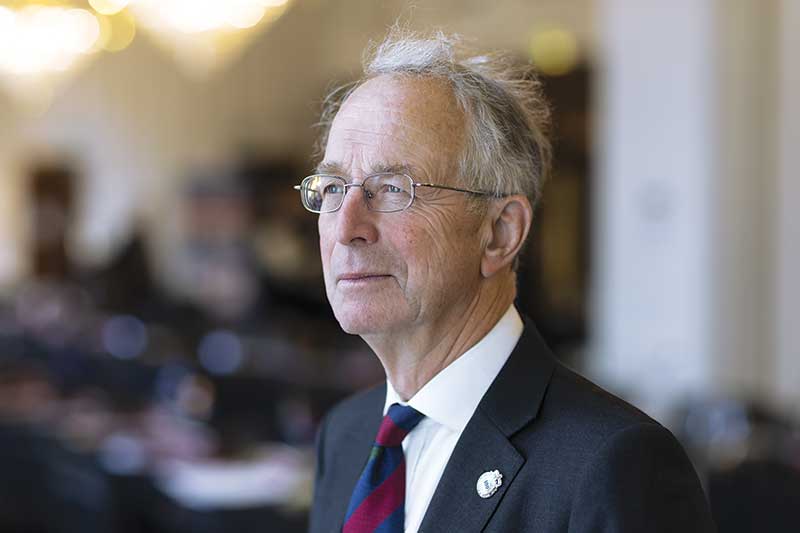
Lord Richards of Herstmonceux, former chief of Britain’s defence staff, was acclaimed for a second term as the league’s grand president after succeeding the late Prince Philip.
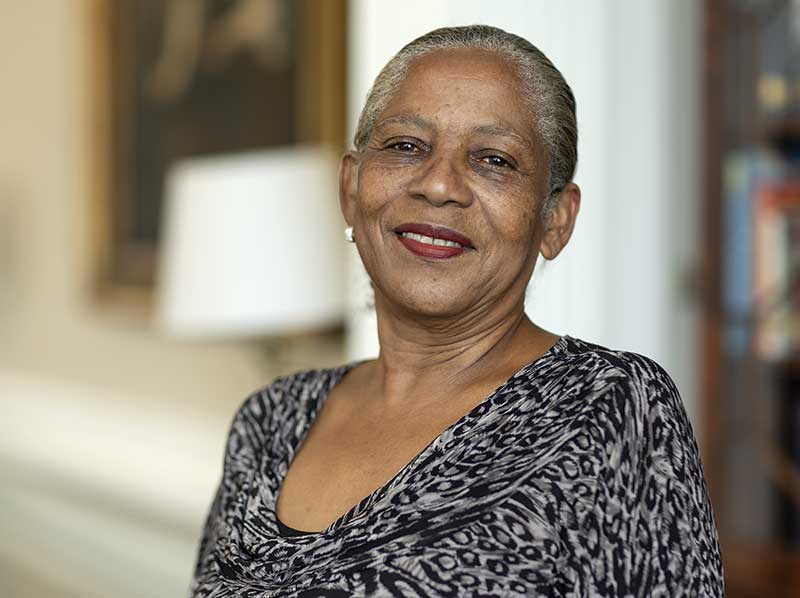
Caribbean RCEL representative Johanna Lewin trained in Canada before becoming a major in the Jamaica Defence Force.
Caribbean representative Johanna Lewin is a retired Jamaica Defence Force major. In 1980, she became the first female helicopter pilot trained by the Canadian military—at Portage la Prairie, Man., where the wind chill, she notes with a shiver, dropped to -70 C.
RCEL payments are modest but they “are a lot more” than some recipients would otherwise have, said Lewin. “It is more than vital,” she said. “Some of them have almost nothing.”
Lewin told the story of Stanley Francis, who was 98 years old when she met him three years ago.
“He was living alone at home. He had no lights or electricity. He had no pension, no income whatsoever. So, what the Royal Air Force Benevolent Fund sends through RCEL for him is like manna from heaven.
“It helps us to be able to take care of him at the Curphey Home. It is very important.”
The Caribbean islands that have militaries tend to provide small to negligible government assistance to veterans. Those with no armed forces have no support programs for those who’ve served. The league and its partners “are saving lives and allowing people to have some dignity,” said Lewin.
For Earl Francis, saving lives and preserving dignity have been a way of life since he was a young boy helping church volunteers support the poor. For years, the former Sea Scout has organized the poppy appeal in Saint Lucia and helped plan Remembrance Day ceremonies. He also sings bass in the church choir.
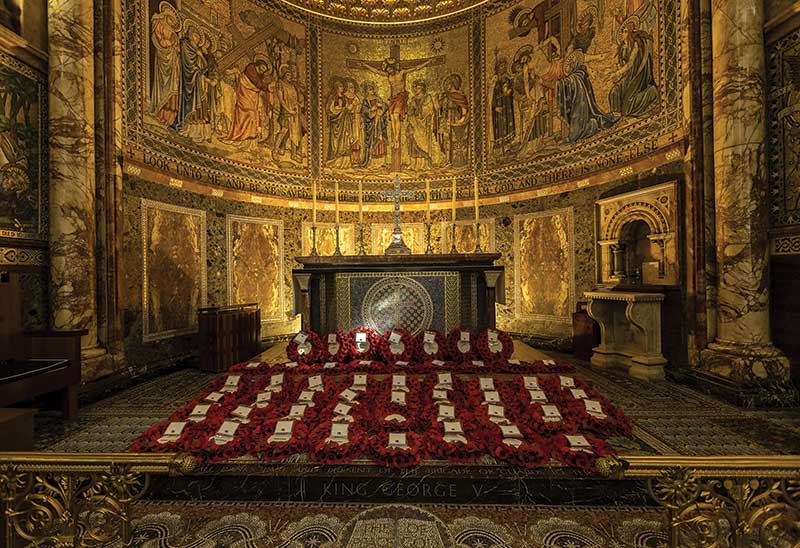
Wreaths lie at the altar of the Guards’ Chapel after an RCEL memorial service.
He says he’ll continue volunteering for the league “as long as I’m able to move.”
“Earl is a treasure,” said Clark. “He is essentially managing the support in Saint Lucia for the veterans and widows on his own. So, when the funds flow down to the organization that he works for (the Saint Lucia Branch of the RCEL), he himself goes out and personally provides the funds to each one of the veterans and the widows.
“And he drives all over the island. It might not sound like a challenge, but it actually is. It’s a huge responsibility that falls on one individual. Earl is quite aged and he does this on his own. But there’s never been a complaint.”
He contracted COVID at the internet café where he filed the reports and submissions that have ensured the organization’s accountability and transparency.
“It was a real concern because of his advanced age, but it was also his commitment to wanting to make sure that none of the people on the island was disadvantaged,” said Clark. “So, as soon as he was able, he went back at it—and contracted COVID a second time.”
Lewin said she and Francis “quarreled” a fair amount at that time over his apparent inability or unwillingness to ease up and take a rest.
“When you see the joy on the faces of the veterans or the widows when they receive that bag of food or that financial assistance so they’re going to be able to eat for the next month, it is incredibly heartwarming,” said Clark.
“And that is enough to make sure that any personal challenges Francis or others may be facing, it’s minor—they’ll overcome them to make sure the beneficiaries receive the support they need.”
The Royal Canadian Legion and its South African counterpart are both bidding for the next conference, in 2025 or ’26, depending in large part on where it is held (2026 will mark the Canadian Legion’s centenary). Canada has previously hosted six conferences.
Advertisement







